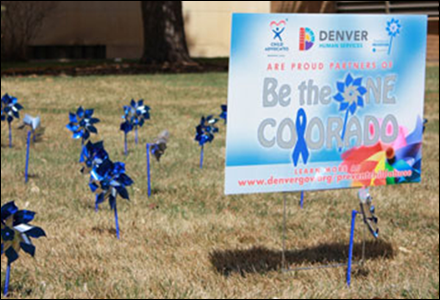Pinwheel garden promotes prevention of child abuse
This pinwheel garden is planted on the southwest lawn of Building 500 on the Anschutz Medical Campus.
They’re popping up in front yards, at community events and in front of city halls. They’re spinning statewide as the country recognizes Child Abuse Prevention (CAP) Month throughout April. They’re pinwheels, the centerpiece of the Pinwheels for Prevention campaign.
The pinwheel represents Colorado’s efforts to change the way our state thinks about prevention, focusing on community activities and public policies that prioritize prevention from the start to make sure child abuse and neglect never occur.
In honor of Child Abuse Prevention Month, the Colorado School of Public Health is partnering with Denver Human Services, Denver Court Appointed Special Advocates, Prevent Child Abuse Colorado and many more agencies by planting our very own pinwheel garden on the southwest lawn of Building 500 on the Anschutz Medical Campus.
“When I read that Denver Human Services was looking for organizations interested in planting a Pinwheel Garden for raising awareness during National Child Abuse Prevention Month in April, I thought it seemed like a natural opportunity for the Colorado School of Public Health to partner with other organizations to promote a message for greater Public Health in the Rocky Mountain Region,” said faculty organizer Amanda Allshouse. “When I mentioned Pinwheels to school’s Faculty Senate, they helped connect me with the Kempe Center.”
The Kempe Center is hosting several awareness activities and events including the annual blue ribbon campaign with Children’s Hospital Colorado.
The school’s pinwheel garden will be on display through mid-April. Stop by to view the garden and think about ways you can “Be the One” to make a difference for a child including:
- Be a Bounce Back Family. Since challenging times impact every family, it’s important to recognize stressful situations and keep a sense of hope. These things can help us take constructive action to turn things around.
- Make Parent Growth a Priority. Take time to learn what is age appropriate and how to set realistic expectations. These tools help us cope positively with various situations.
- Learn More About Child Growth. Helping children develop emotionally helps them identify their feelings, clearly communicate and problem solve, and prepares them for positive social interaction.
- Surround Yourself with a Network of Friends and Family. Having a strong support system of neighbors and community members helps us get needed breaks, cope with difficult times and prevents us from becoming isolated.
- Call a Pro. Getting to know a day care professional, caseworker, teacher or doctor gives us an expert to turn to in times of need.
These five things help make families and our community stronger. To learn more about making a difference, visit www.denvergov.org/BeTheOne.


